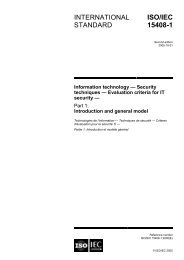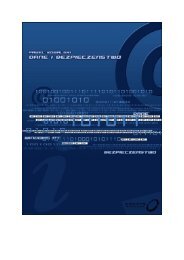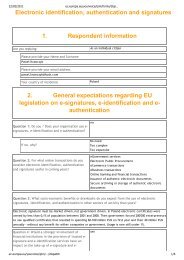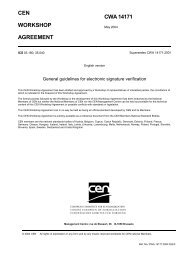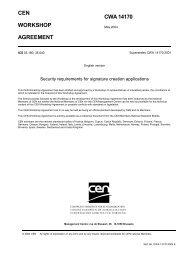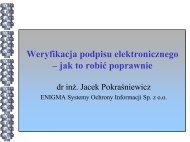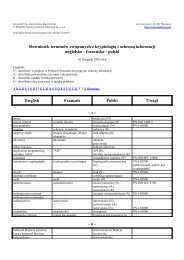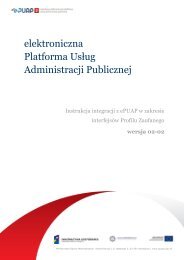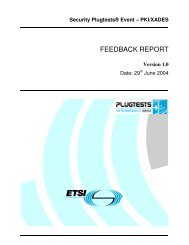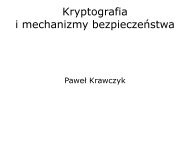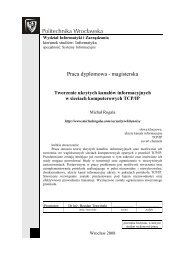When electronic signature becomes a information services ... - IPSec
When electronic signature becomes a information services ... - IPSec
When electronic signature becomes a information services ... - IPSec
Create successful ePaper yourself
Turn your PDF publications into a flip-book with our unique Google optimized e-Paper software.
It follows that official communications still had to occur, and they continued to be transacted<br />
on paper, not because people were afraid of Internet as some claimed, 42 but because the<br />
solution created with the QES was not easy to use and expensive.<br />
The view that it was only possible to use a qualified <strong>electronic</strong> <strong>signature</strong> was supported by<br />
some certification authorities that acted in various ways to encourage their use, and requested<br />
the government to create incentives for citizens to use a QES. These efforts were partially<br />
successful. Attempts to liberalise the use of qualified <strong>electronic</strong> <strong>signature</strong>s were effectively<br />
prevented in 2004, when they were first mentioned, until 2010 when new draft law should be<br />
enacted (Projekt z dnia 23.03.2010 – Ustawa o podpisach elektronicznych). As result, in 2005<br />
Poland implemented Directive 2001/115/EC 43 and subsequently enacted the e-invoicing<br />
legislation: Rozporządzenie Ministra Finansów z dnia 14 lipca 2005 r. w sprawie wystawiania<br />
oraz przesyłania faktur w formie elektronicznej, which only permitted the use of the QES and<br />
EDI as a means of authentication. This legislation effectively ensured e-invoicing did not occur<br />
in Poland for some time.<br />
Where the qualified <strong>electronic</strong> <strong>signature</strong> does not work<br />
E-invoicing was introduced to reduce the cost of traditional invoicing – printing, paper, human<br />
work, postal <strong>services</strong> etc – and it makes sense only if the cost is indeed smaller. The QES was<br />
introduced to provide high levels of security, including non-repudiation – which is arguably<br />
irrelevant in the case of e-invoicing. 44 E-invoicing is about fast, automated generation and<br />
provision of VAT tax and deduction <strong>information</strong>. The objectives of a QES are the opposite – it<br />
42<br />
The ‘Poles are afraid of Internet’ excuse was offered for a number of times by various representatives of the public administration<br />
when asked about the low usage of QES <strong>services</strong>. But according to the 2010 Reader’s Digest study ‘European Trusted Brands’, over 70 per<br />
cent of Poles trusted Internet, with a European average of 49 per cent (a copy is available from http://www.rdtrustedbrands.com/).<br />
43<br />
Council Directive 2001/115/EC of 20 December 2001 amending Directive 77/388/EEC with a view to simplifying, modernising<br />
and harmonising the conditions laid down for invoicing in respect of value added tax, OJ L15, 17.1.2002, p. 24–28.<br />
44<br />
There can be a significant requirement for non-repudiation (that is, proof that data was sent to and from computers). For example,<br />
there are a number of corporate banks and investment funds in Poland (e.g. Nordea, Fortis) which seem to make their clients use a digital<br />
<strong>signature</strong> (not necessarily a QES) intentionally, to reduce the risk of a claim by the customer that they were not responsible for sending the<br />
communication in the event of a failed investment or late payment (but see the Russian cases: Olga I. Kudryavtseva, ‘The use of <strong>electronic</strong><br />
digital <strong>signature</strong>s in banking relationships in the Russian Federation’, Digital Evidence and Electronic Signature Law Review, 5 (2008) 51 –<br />
57; Olga I. Kudryavtseva, Case note: Resolution of the Federal Arbitration Court of Moscow Region of 5 November 2003 N КГ-А 40/8531-<br />
03-П, Digital Evidence and Electronic Signature Law Review, 5 (2008) 149 – 151.) For a short time there was lobbying to enforce this at<br />
consumer banks, but it stopped very quickly when the banks realised it would effectively stop all consumer Internet banking in Poland. In 2008<br />
a number of experts, including representatives of Nordea bank and PIIT (Polska Izba Informatyki i Telekomunikacji – a telecom chamber)<br />
praised this solution in the public media: ‘Banki przesądzą o e-podpisie’, 15 May 2008, Gazeta Wyborcza.



